Sports Nutrition: Healthy Carbs, Protein & Fats To Improve Performance & Recovery
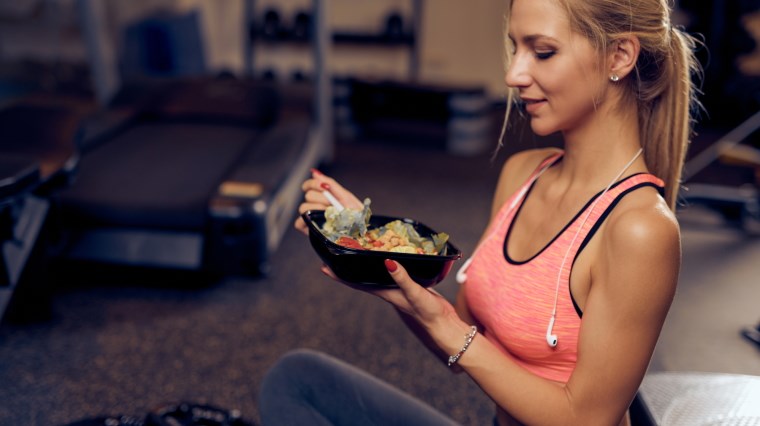
Understanding sports nutrition and how it can improve your performance and recovery is essential for athletes of all levels. A well-balanced diet that meets the energy demands of running or wherever your passion lies is crucial for your overall health and improving athletic skills like speed, endurance and agility.
As an athlete you may have tunnel vision when it comes to training itself and the importance of both nutrition and recovery can be underestimated.
The fitness trifecta of training, nutrition and recovery all have a role. What you eat can influence everything from muscle strength to brain function and how well your body ‘springs back’ from long training sessions and high-intensity efforts.
We’re here to help you eat well so you can train even better. This nutrition guide provides a user-friendly breakdown of carbohydrates, protein and fats, explaining what each can do for your body to support your active lifestyle. We’ll also touch on the importance of fruits and vegetables as the foundations of your training nutrition plan begins with a healthy day-to-day diet.
Nutrition planning goes a long way towards maintaining a healthy and wholesome diet to fuel your performance and speed up or support your recovery. We’ve provided examples of quality sources of carbs, proteins, fats and fruit and vegetables that can be kept on hand in your fridge, freezer and pantry.
Carbohydrates: Primary source of energy
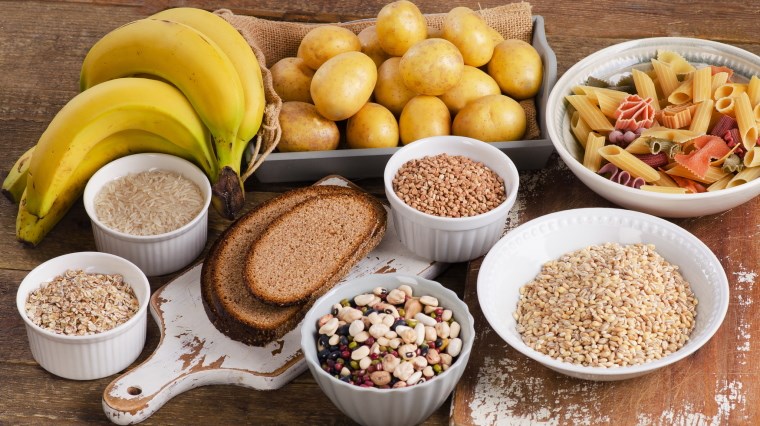
Carbohydrates come in the form of fibre, starch and sugars and can be sourced from a variety of foods, everything from nutrient-dense vegetables and grains to sugary baked goods that are best kept to a minimum.
Your body converts carbohydrates into a source of energy referred to as glucose (a type of sugar). Excess glucose is stored as glycogen, mainly in the liver. Glycogen is one of the main energy sources that your body draws upon during anaerobic activity (high-intensity movement).
It’s essential to top up glycogen to fuel the muscles involved in physical activity and improve brain function. Having this stored energy not only makes your body work better but helps sustain your motivation on and off the court, field, gym or road.
Bread, pasta, rice, grains and starchy vegetables (e.g. potato, sweet potato, corn and beans) are the big names in high-carb foods, but they can also be sourced in varying qualities from other vegetables, fruit and dairy products.
Carbohydrates get a bad rap but it’s the type or quality of carbohydrate that makes all the difference. Carbohydrates in the form of added sugars like soft drinks and donuts should be avoided, but it’s a completely different story when it comes to wholegrain carbohydrates.
Wholegrain versus refined carbohydrates
It’s recommended that you choose wholegrain carbohydrates as opposed to refined carbohydrates. Wholegrain carbohydrates (e.g. wholegrain bread, wholegrain pasta, wholegrain cous cous, quinoa, oats and legumes) have a greater nutritional value intact as they include all three parts of the grain kernel - the bran (fibre-rich shell or outer layer), the endosperm (starchy inner layer) and the germ (core of the seed).
They provide slow-releasing energy and are higher in fibre than refined carbohydrates. A high-fibre diet may reduce your risk of heart disease, diabetes and bowel cancer. Wholegrains are beneficial for your digestive health and keep you feeling satisfied for longer – squashing those 3pm snack cravings.
Refined carbohydrates in the form of processed products like white bread and white rice are easier to digest by your body. This means they cause a spike in energy followed by an energy slump shortly after, rather than a steady release of energy throughout the day. In refined products, the bran and germ of the grain kernel are removed, leaving only the high-carb endosperm. This creates a ‘fluffier’ product when it comes to bakery goods like cakes and biscuits but strip the grain of most of its nutritional value.
Although wholegrain carbohydrates have dramatically more nutritional benefits and should be the go-to in your everyday and training nutrition, refined carbs do have a place in an athlete’s diet as a source of energy leading up to and on race day. During endurance or high-intensity efforts, refined carbohydrates tend to put athletes at a lower risk of digestive discomfort when compared to their more nutrient-rich wholegrain cousins that are slower and harder to break down by the body.
Healthy sources of carbohydrates to enjoy at home include:
Fridge / Freezer
- Wholegrain bread
- Corn
Fridge
- Bananas
- Grapes
- Apples
Pantry
- Wholegrain pasta
- Wholegrain cous cous
- Wholegrain crackers
- Quinoa
- Oats
- Canned chickpeas, lentils and beans
- Potatoes (ideally skin on) and sweet potatoes
Protein: Muscle Growth & Repair
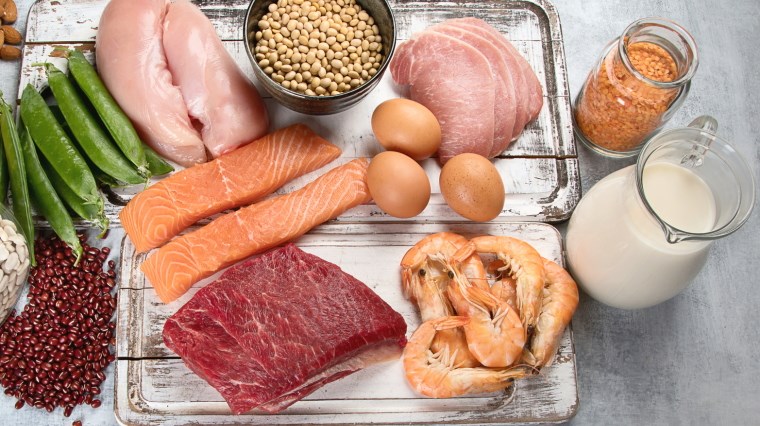
The protein requirements of training athletes are much higher than in a sedentary lifestyle. Every time you put foot to pavement whether for training or competition, your muscles fibres break down from the physical stresses of your sport as they contract during sprints, runs and jumps.
With the help of protein, your body can build muscle mass (a process called muscle protein synthesis) to adapt and strengthen, speeding up your recovery.
Alike with carbohydrates, the type of protein makes a difference. Animal products like lean beef, poultry (e.g. chicken and turkey), fish, eggs and dairy (e.g. low-fat yoghurt and skim milk) are considered ‘complete’ proteins – containing all 9 essential amino acids (building blocks of proteins) that can’t be produced by your own body.
Excluding quinoa, buckwheat and soy-based foods (e.g edamame beans, tofu and soy milk), most plant-based foods like legumes (e.g. chickpeas, lentils and beans), nuts and seeds are ‘incomplete’ proteins – they do not contain all the essential amino acids. Therefore, particularly for vegan and vegetarians a balanced diet that includes a variety of plant-based foods is recommended to fill in the gaps of any ‘missing’ amino acids in the diet.
Also, be aware that vegan, vegetarian and female athletes tend to have a higher risk of iron deficiency. Meat and seafood is a valuable source of easily absorbed iron, but it can also be derived from plant-based sources including spinach, beans and lentils.
Although protein can be used as a source of energy when your carb intake is low, it cannot be stored by the body for later use and any excess will be stored as fat, potentially leading to weight gain.
It’s often recommended that training athletes include a source of protein with every meal. However, be sure to limit your intake of protein sources that are high in saturated fat (e.g. fatty red meat and full-fat dairy) and opt for leaner sources.
Healthy sources of protein to enjoy at home include:
Fridge / Freezer
- Chicken breast (skin off)
- Lean beef
- Salmon
- Tofu
Fridge
- Low-fat Greek yoghurt
- Low-sugar peanut butter or almond butter
- Lite or skim milk
- Hummus
- Eggs
- Dark green vegetables including peas, broccoli, brussels sprouts and spinach (pair with a source of vitamin C like citrus fruit to boost iron absorption)
- Mushrooms
Pantry
- Canned chickpeas, lentils and beans
- Unsalted nuts (e.g. walnuts, almonds, pistachios and hazelnuts)
- Seeds (e.g. pumpkin seeds and chia seeds)
Vegetables & Fruit: Vitamins, minerals and antioxidants
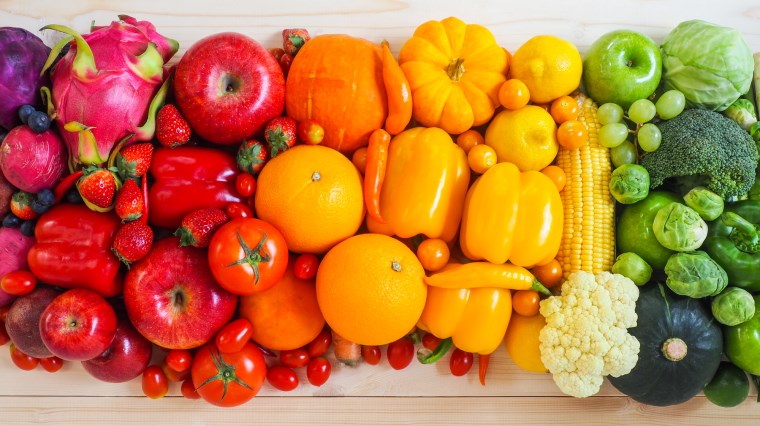
A colourful diet generally indicates it’s nutrient-rich and well-balanced. No, we’re not referring to rainbow-coloured sprinkles but an assortment of naturally coloured fruits and vegetables to improve the nutritional content of every meal.
It’s easier than ever to include them in your diet with access to fresh, frozen, dried or canned varieties at your supermarket, or if you prefer to stick to fresh only, visit your local farmers' market.
Alongside being high in vitamins, minerals and naturally occurring antioxidants (to fight off cancer-causing free radicals), fruit and vegetables provide a source of fibre to support your digestive health. Opt for fruit and vegetables in their whole form as opposed to juices which strip them of their fibre content.
Whether frozen, fresh from the fridge or canned from the pantry, get a variety of colours on your plate:
- Green fruit and vegetables like green apples, spinach, kale, asparagus, celery, peas, broccoli and brussels sprouts
- Red fruit and vegetables like tomato, watermelon, red capsicum and raspberries
- Orange and yellow fruit and vegetables like oranges, lemons, carrot and sweet potatoes
- Blue and purple fruit and vegetables like blueberries, blackberries, eggplant and purple cabbage
- White vegetables like mushroom (technically a fungi) and cauliflower
Eat raw, steamed, baked or stir fried.
‘Good’ Fats: Improve heart health & lower bad cholesterol
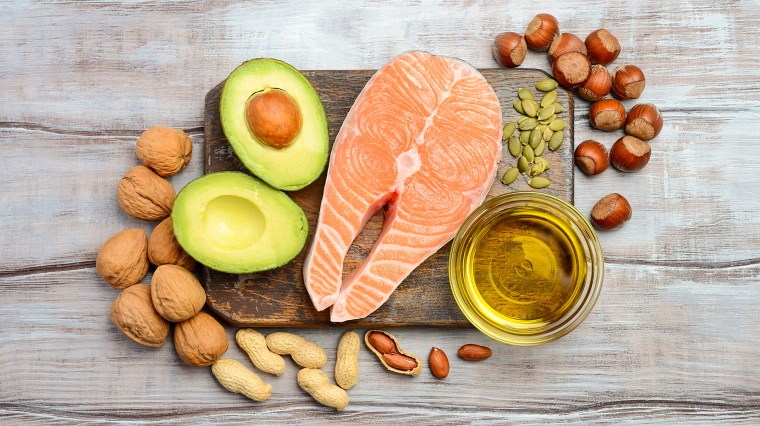
'Good’ unsaturated fats contribute to your heart health when eaten in moderation – elevating good HDL cholesterol levels and decreasing harmful LDL cholesterol levels. They boost the absorption of specific vitamins (e.g. fat-soluable vitamins including Vitamin A, D, E and K) and provide energy for low to moderate intensity exercise like endurance training.
Eating polyunsaturated fats increases your intake of heart-healthy omega-3 fatty acids (e.g. from oily fish and other seafood as well as plant sources including chia seeds and flaxseeds) and omega-6 fatty acids (e.g. from plant oils, tofu, seeds and nuts, particularly walnuts). Omega-3 and omega-6 contain essential fatty acids (alpha-linolenic acid and linoleic acid respectively) that must be sourced from your diet as your body is unable to produce them.
Sources of healthy monounsaturated fats include potassium and fibre-rich avocados, nuts, seeds and plant oils (e.g. extra virgin olive oil, peanut oil, sesame oil and soybean oil).
Being fats, they are high in calories compared to proteins and carbs but be aware it’s the foods that are high in saturated fats and trans fats that you should keep to a minimum. These types of fats can negatively affect your heart health – not to mention leave you feeling sluggish on your training days.
Trade in the high-fat dairy (e.g. ice cream, cheese and cream), deep-fried foods, processed or fatty meats and bakery goods with a high butter content (e.g. biscuits, cakes and croissants) for healthy sources of fats.
Healthy sources of fats to enjoy at home include:
Fridge / Freezer
- Oily fish (e.g. salmon, trout, mackerel and sardines)
- Tofu
Fridge
- Avocado
- Olives
- Low-sugar peanut butter or almond butter
- Tahini (sesame seed spread)
- Eggs (with yolk)
Pantry
- Plant oils (e.g. extra virgin olive oil, sesame oil, peanut oil and soybean oil)
- Unsalted nuts (e.g. walnuts, almonds, pistachios, hazelnuts and pinenuts)
- Seeds (e.g. sunflower seeds, chia seeds, linseed and flaxseed)
- High quality dark chocolate with 70% - 90% cocoa solids (the darker the better) – in moderation, because you deserve to treat yourself occasionally!
Water: Hydration
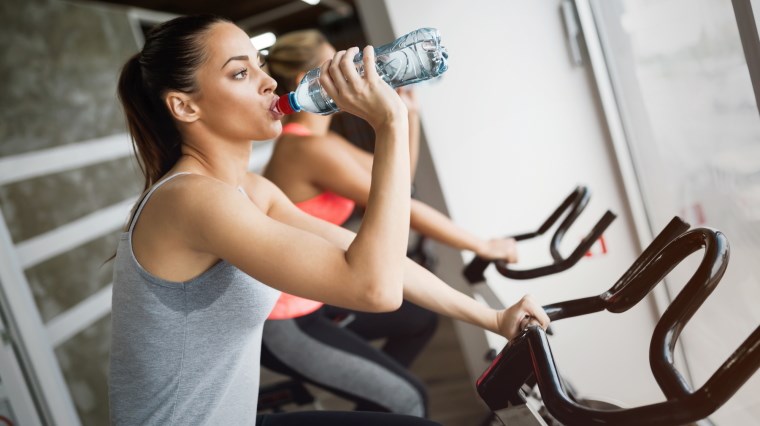
The adult human body is made up of about 60% water. Water is crucial to survival and to maintain healthy bodily functions – from the transport of your oxygen-rich blood to your tissues and the lubrication of muscles and joints, to your digestive health, immune system function and temperature regulation.
It’s no surprise that an inadequate intake of water leads to dehydration with symptoms including thirst, headaches, fatigue, light-headedness and irritability.
Keeping a water bottle on your desk or coffee table and carrying it with you during the day makes drinking water convenient and acts as a reminder to stay hydrated. As a runner, it's also vaulable to know how to hydrate for short and long runs.
As water is lost in perspiration, athletes need to take extra care to increase water intake leading up to training and competition, as well during and after physical activity. The Sweat Rate Test can help guide you in fulfilling your personal hydration demands.
Sugary or artificially sweetened drinks like soft drinks are no substitute for plain water. If you prefer flavoured drinks, try drinking carbonated water or water with a slice of lime or lemon, or mint and berries for natural flavour.
The Wrap Up
Enjoying a wholesome, nutritious diet not only improves your overall health but provides quality sources of energy to meet the demands of your sport and support recovery.
Mentally, good nutrition can help you maintain the focus and motivation required to stay on track of your training as well as improve your decision-making skills during competition. Physically, when paired with training and a thought-out recovery plan, it can improve your speed, endurance, coordination and strength.
Seek advice from your dietitian to create a nutrition plan that meets the energy requirements of your personal training program.
If you liked this you'll love:
8 Essential Hydration Tips About Water, Sports Drinks & Sweat
PREPD Hydration: Your Secret Weapon To Improve Performance & Recovery
Magnesium Is Good For Muscle Cramps, Sleep & Recovery. Here's How To Get Enough.
